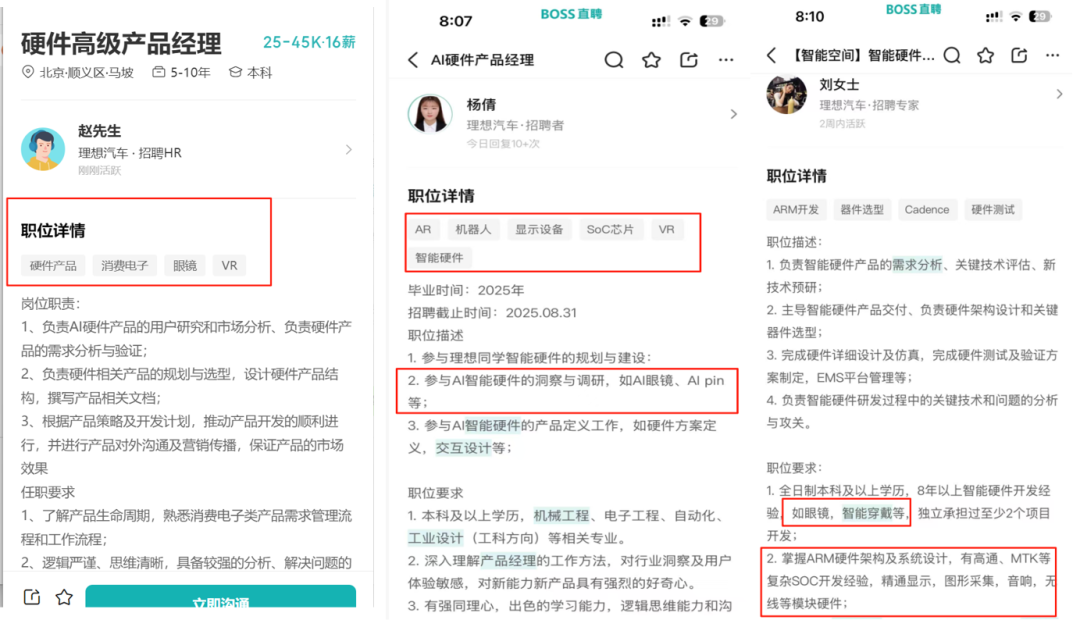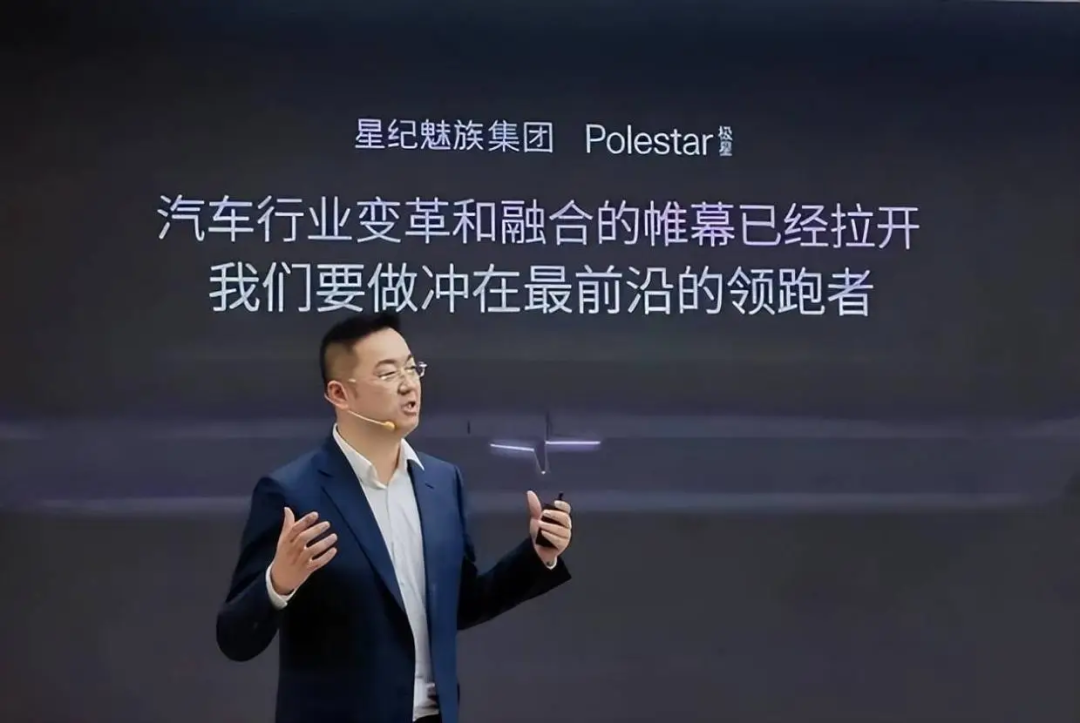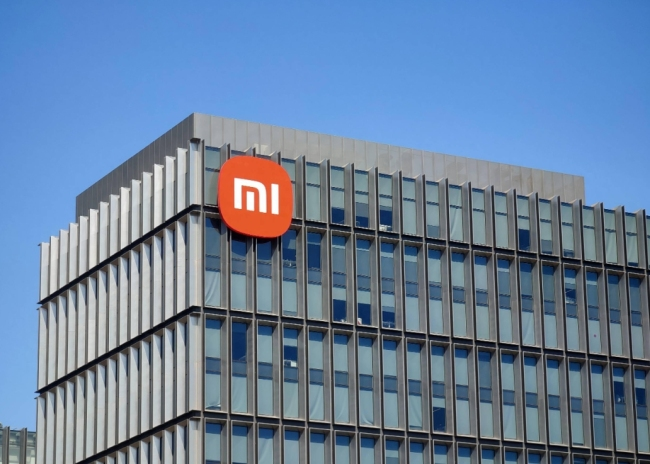Car Companies' Internal Competition Reaches New Heights! Rumor Has It Li Auto is Secretly Deploying AI Glasses: Is the Next Battleground for Smart Cars on the Bridge of the Nose?
![]() 05/09 2025
05/09 2025
![]() 760
760
The smart car landscape has escalated to new competitive heights, with automakers' battlegrounds no longer confined to traditional 'refrigerator, color TV, sofa' configurations but extending into the more core AI interaction frontier.
Recently, XR Vision Pro revealed shocking news: Li Auto is suspected to be recruiting product managers and technicians related to AI smart glasses, potentially indicating its current deployment in this field.
From the recruitment page, the three positions being sought are Senior Hardware Product Manager, AI Hardware Product Manager, and Smart Hardware Development Engineer, with job descriptions intricately linked to AI smart glasses. Specifically:
Senior Hardware Product Manager: The position tags clearly state 'glasses' and 'VR', focusing on AI hardware products and consumer electronics.
AI Hardware Product Manager: Involves technical directions such as AR, VR, robotics, and SoC chips, requiring participation in the planning of 'Li Auto Classmate' smart hardware and market research for innovative products like AI glasses and AI Pins.
Smart Hardware Development Engineer: Requires experience in hardware development of smart glasses and wearable devices.
XR Vision Pro also claimed that there were rumors in the supply chain that Li Auto was conducting research on AI smart glasses, and these recruitment positions further substantiate this news.
This news is akin to a huge stone thrown into a calm lake, causing ripples and sparking speculation: Is Li Auto poised to enter the AI smart glasses arena? Has the competition in smart cars now reached the stage of 'competing for peripherals'? What deeper meaning lies behind this move?

Image source: XR Vision Pro
What strategic chess move is Li Auto planning next?
Currently, the automotive industry is witnessing an arms race for 'smart cockpits', while Li Auto seems to have opted for a different innovative path.
At first glance, car companies' cross-border research and development of smart glasses might seem like a case of 'neglecting one's proper duty'. However, upon deeper analysis, it becomes evident that this strategic layout underscores the forward-thinking approach towards the intelligent transformation of the automotive industry. They seem to be aiming for a 'glasses + car machine' combo. Imagine: while driving, you don't need to look down and tap the screen; simply put on a pair of glasses and command 'Li Auto Classmate' with a lip movement. Isn't that cooler than swiping on a screen?
Firstly, the most vexing aspect of driving is having to free up your hands to operate a device. Smart glasses seamlessly solve this issue – you only need to keep your eyes on the road, move your lips or blink, and everything is done. Stumble upon a breathtaking view on a road trip? Blink, and the photo is captured. Encounter an emergency on the road? Don't panic; the glasses will automatically record it for you. This is much safer and more convenient than pulling out your phone.
Furthermore, many users already have the habit of wearing sunglasses while driving. If sunscreen sunglasses and smart glasses can be integrated into one, they can not only block ultraviolet rays but also serve as an AI assistant. Doesn't this directly address the pain points of car owners? It meets functional needs without worrying about the sun's glare, killing two birds with one stone.
From a safety perspective, the use of smart glasses significantly reduces operational risk during driving. Features like emergency recording and voice control allow drivers to focus more on road conditions, vastly improving driving safety.

Li Auto's personal deployment in the AI smart glasses track this time may stem from its huge potential in enhancing the user's driving experience and safety when combined with smart car driving scenarios. Moreover, Li Auto's positioning for Mind GPT isn't limited to the car but can be used both 'in the car and at home'. AI smart glasses are indeed the optimal hardware carrier for 'Li Auto Classmate'.
Therefore, Li Auto's deployment in AI glasses isn't a whim. It aims not only to enhance the driving experience but also to create a holistic smart ecosystem encompassing 'people-car-home'. It seems that on the path of intelligence, car companies are playing in increasingly sophisticated ways.

Not only Li Auto but also other car companies are deploying similar strategies.
On this burgeoning track with unlimited potential for the interconnection of smart wearables and cars, major automakers are gearing up, each displaying their unique strengths and engaging in fierce competition. Nowadays, a battle around the 'smart ecosystem' has already commenced, with all parties eager to seize the initiative in this silent war and emerge as leaders in the realm of future smart travel.
Among them, the smart glasses track has become a key area where many car companies compete. Besides Li Auto, automakers like Geely Automobile have also exhibited great enthusiasm and active deployment attitudes, diving into this field in an attempt to secure a share of the blue ocean market.
Back in 2022, Geely Automobile acquired a controlling stake in Meizu with a fund of up to 10 billion yuan, a move that sparked widespread industry doubts at the time. Many believed that 'car companies making phones is putting the cart before the horse', deviating from the core business of car manufacturing.
However, time is the best witness.
In 2023, the official establishment of the Starrealme Group gradually dispelled all doubts. Its self-developed Flyme Auto in-vehicle system has been deeply integrated into brands like Polestar and Lynk & Co., achieving seamless connection between in-vehicle navigation and mobile phones, and even creating a cool 'heads-up display' experience with AR glasses. Drivers can effortlessly obtain key information without looking down during driving, significantly enhancing driving safety and convenience.

Judging from Starrealme's current business layout, the integration of smart terminals and the automotive ecosystem is undoubtedly its core strategic direction. Its business scope broadly covers three key segments: smartphones, smart glasses, and smart cars, with the integration of smart terminals and the automotive ecosystem at the forefront.
Starrealme pioneered the concept of the 'mobile domain' in the industry, making mobile phones truly integrate into and become a part of the car, realizing seamless connection, ecological sharing, and capability sharing between mobile phones and in-vehicle systems. Simultaneously, with the support of the full-scenario ecological concept, cars, mobile phones, tablets, smart glasses, rings, and other IoT devices achieve interconnection and capability complementarity, offering users a multi-terminal, full-scenario, immersive integrated ecological experience.
It's worth mentioning that previous news revealed that Xiaomi will launch a new generation of AI smart glasses in the second quarter of 2025. Although primarily targeted at the consumer market, its synergy with Xiaomi cars cannot be underestimated, providing diverse ideas and exploration directions for the development of the interconnection between smart wearables and cars.

Summary
While the prospects appear promising, the road to the widespread adoption of smart glasses is fraught with challenges. Technical bottlenecks, such as battery life and weight issues, loom large. Additionally, changing user habits to accept this novel interaction method won't happen overnight. Coupled with the intricate competitive and cooperative dynamics between automakers and technology companies, this poses considerable challenges to the promotion of smart glasses.
But one thing is certain: with the continuous maturation of AI large models and AR technology, smart glasses are likely to become the next generation of interaction hubs for smart cars, following the central control screen and voice assistant. The deployment by car companies has long surpassed competition for a single product but is now about the battle for the right to speak in the future travel ecosystem.
In this 'battle' for the interconnection between smart wearables and cars, each automaker possesses its unique secret recipe and winning talisman. Who will ultimately emerge victorious in this 'smart ecosystem' war and become the industry leader? Let's grab our seats and wait eagerly to find out.
Written by Vivi
(Images not marked with sources in the article are sourced from the internet)








